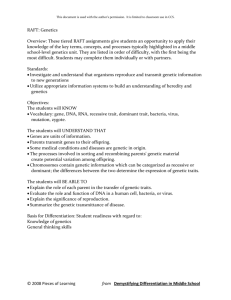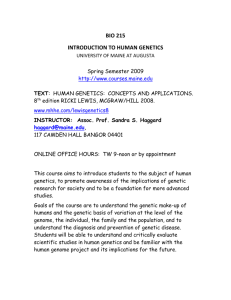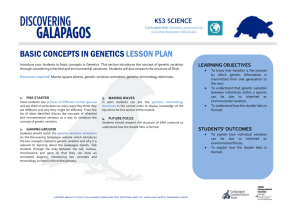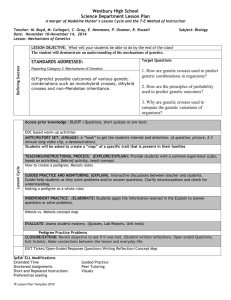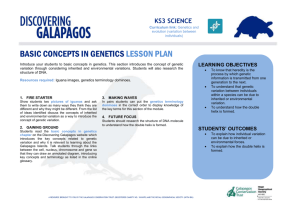Part-time Consultant in Clinical Genetics (6 sessions)
advertisement
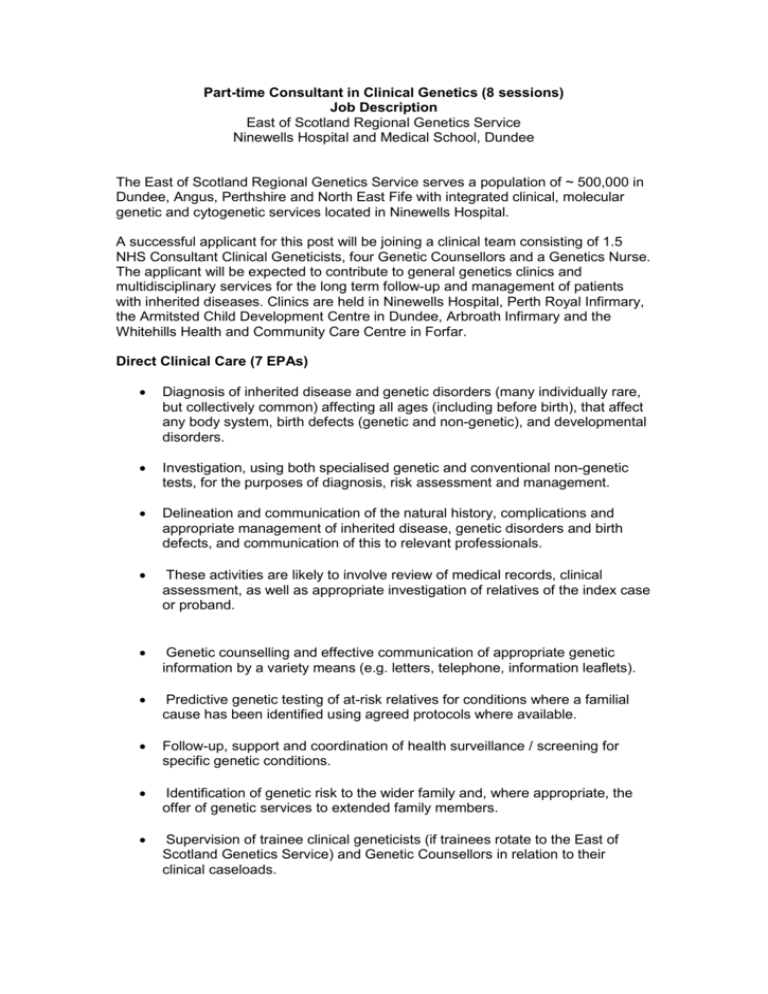
Part-time Consultant in Clinical Genetics (8 sessions) Job Description East of Scotland Regional Genetics Service Ninewells Hospital and Medical School, Dundee The East of Scotland Regional Genetics Service serves a population of ~ 500,000 in Dundee, Angus, Perthshire and North East Fife with integrated clinical, molecular genetic and cytogenetic services located in Ninewells Hospital. A successful applicant for this post will be joining a clinical team consisting of 1.5 NHS Consultant Clinical Geneticists, four Genetic Counsellors and a Genetics Nurse. The applicant will be expected to contribute to general genetics clinics and multidisciplinary services for the long term follow-up and management of patients with inherited diseases. Clinics are held in Ninewells Hospital, Perth Royal Infirmary, the Armitsted Child Development Centre in Dundee, Arbroath Infirmary and the Whitehills Health and Community Care Centre in Forfar. Direct Clinical Care (7 EPAs) Diagnosis of inherited disease and genetic disorders (many individually rare, but collectively common) affecting all ages (including before birth), that affect any body system, birth defects (genetic and non-genetic), and developmental disorders. Investigation, using both specialised genetic and conventional non-genetic tests, for the purposes of diagnosis, risk assessment and management. Delineation and communication of the natural history, complications and appropriate management of inherited disease, genetic disorders and birth defects, and communication of this to relevant professionals. These activities are likely to involve review of medical records, clinical assessment, as well as appropriate investigation of relatives of the index case or proband. Genetic counselling and effective communication of appropriate genetic information by a variety means (e.g. letters, telephone, information leaflets). Predictive genetic testing of at-risk relatives for conditions where a familial cause has been identified using agreed protocols where available. Follow-up, support and coordination of health surveillance / screening for specific genetic conditions. Identification of genetic risk to the wider family and, where appropriate, the offer of genetic services to extended family members. Supervision of trainee clinical geneticists (if trainees rotate to the East of Scotland Genetics Service) and Genetic Counsellors in relation to their clinical caseloads. Maintenance of paper records and/or an electronic clinical management system and patient database, and genetic family register(s). Liaison with genetic laboratories, including discussion and interpretation of complex results and data of uncertain significance. Participation in local and national clinical networks, e.g. Scottish Clinical Genetics Forum, Dysmorphology meeting, Cancer Genetics Group. Provide a resource of expertise and information for other specialists, primary care doctors and other health professionals, including interpretation of laboratory reports conveying complex genetic results and data, both pathogenic and those of uncertain significance. Recruitment of suitable patients to national research studies, screening studies and, where appropriate, clinical trials. Supporting Activities (1 EPA) Includes a wide range of non-direct patient contact activities. Service development and liaison with other disciplines across the healthcare organisations of the East of Scotland Genetics Service catchment area. Development of service guidelines and standards. Liaison with genetics laboratories in relation to the clinical implications pertaining to the introduction of new technologies. Participation in clinical governance and clinical audit. Continuing professional development (genetics is a rapidly advancing science, thus making this particularly important). Appraisal of fellow consultants and other genetic professionals, as necessary. Involvement in research – clinical, biomedical, psychosocial and service related; active recruitment of patients to research projects nationally and internationally. Education and training of other medical and health care professionals, sometimes through multidisciplinary team meetings, especially in relation to rapidly evolving knowledge in genetics; for example, the introduction of high throughput technologies and generation of complex data from laboratory genetic tests. Work in support of local Trust and/or University. Teaching of clinical genetics, and the broader subject of human genetics, to medical (and sometimes other) undergraduates, especially in relation to the clinical application of new technologies. Representing the speciality through local and national committees or working groups. Interaction with patient support groups, attendance of MDT and clinical network meetings, and availability for advice (in areas of special interest).





